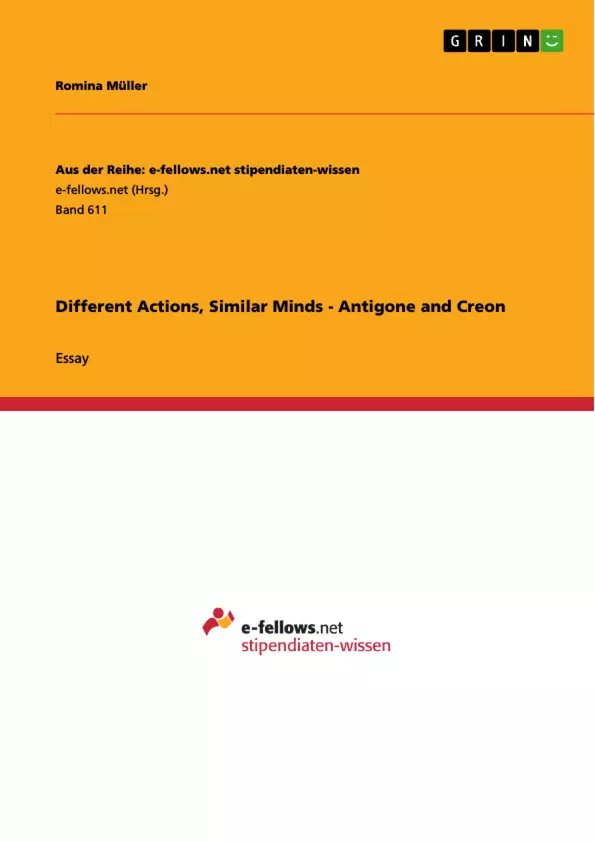Many times, people seem different by the actions they take. It is easy to judge another person by the goals and visions this person has and pursues as well as his or her values, not paying attention to the underlying character. However, no matter how different these goals are, the personality of the two persons can still be much alike. Examples for this are Antigone and Creon in Sophocles’ Antigone. Although similar in character, the visions and values that they follow are so distinct from each other, that it makes it easy to take side for one of them. With her values and her loyalty to the individual, Antigone is the one who overall wins my side and sympathy over Creon.
Table of Contents
- Different Actions, Similar Minds - Antigone and Creon
Objectives and Key Themes
This paper analyzes the characters of Antigone and Creon in Sophocles' Antigone, comparing and contrasting their actions and motivations. The goal is to demonstrate that despite their seemingly disparate actions, they share underlying similarities in personality. The paper also explores the author's personal response and sympathy towards each character.
- Comparison of Antigone and Creon's character traits
- Contrast of Antigone and Creon's values and loyalties (individual vs. state)
- Analysis of the consequences of their actions
- Exploration of the theme of hubris
- The author's personal interpretation and sympathy towards Antigone
Chapter Summaries
Different Actions, Similar Minds - Antigone and Creon: This chapter introduces the central argument: that Antigone and Creon, despite their contrasting actions, share core personality traits. The author establishes a framework for comparing their strong, confident, and stubborn natures, highlighting instances of self-centeredness in both characters. The chapter lays the groundwork for a deeper exploration of their differing values—Antigone's loyalty to the individual and Creon's loyalty to the state—which fuel their conflicting actions. The author's initial leaning toward sympathy for Antigone is also introduced, setting the stage for the subsequent analysis. The chapter uses examples from Sophocles' Antigone to showcase the characters' stubbornness and self-centeredness. It emphasizes that while their goals differ greatly, their personalities show striking similarities, making the conflict more compelling.
Keywords
Antigone, Creon, Sophocles, Greek tragedy, hubris, loyalty, individual vs. state, family, law, character analysis, sympathy, self-centeredness, stubbornness.
FAQ: Analysis of Antigone and Creon in Sophocles' *Antigone*
What is the main focus of this academic paper?
This paper analyzes the characters of Antigone and Creon in Sophocles' Antigone, comparing and contrasting their actions and motivations. The central argument is that despite their seemingly opposite actions, Antigone and Creon share underlying similarities in their personalities.
What are the key themes explored in the paper?
The paper explores several key themes, including: a comparison and contrast of Antigone and Creon's character traits; a contrast of their values and loyalties (individual vs. state); an analysis of the consequences of their actions; an exploration of the theme of hubris; and the author's personal interpretation and sympathy towards each character.
What specific character traits are compared and contrasted?
The analysis focuses on the strong, confident, and stubborn natures of both Antigone and Creon. The paper highlights instances of self-centeredness in both characters, demonstrating that while their goals differ greatly, their personalities exhibit striking similarities.
How does the paper address the conflict between Antigone and Creon?
The conflict stems from opposing values: Antigone's loyalty to the individual (family) and Creon's loyalty to the state. The paper examines how these differing loyalties fuel their conflicting actions and contribute to the overall tragedy.
What is the role of the author's personal interpretation?
The author expresses a personal response and sympathy toward each character, particularly Antigone. This personal interpretation is woven throughout the analysis, offering a subjective perspective alongside the objective comparison of the characters' actions and motivations.
What are the chapter summaries included in the preview?
The preview provides a summary of the main chapter, "Different Actions, Similar Minds - Antigone and Creon." This chapter introduces the central argument, establishes a framework for comparing Antigone and Creon's personalities, highlights their shared traits (stubbornness, self-centeredness), and explores their contrasting values and loyalties. The chapter also sets the stage for the author's subsequent analysis and expression of sympathy toward Antigone.
What are the keywords associated with this academic paper?
Keywords include: Antigone, Creon, Sophocles, Greek tragedy, hubris, loyalty, individual vs. state, family, law, character analysis, sympathy, self-centeredness, stubbornness.
What is the overall goal of the paper?
The overall goal is to demonstrate that despite their contrasting actions, Antigone and Creon share significant personality similarities, making their conflict more compelling and offering a nuanced understanding of their tragic fates.
- Quote paper
- Romina Müller (Author), 2012, Different Actions, Similar Minds - Antigone and Creon, Munich, GRIN Verlag, https://www.grin.com/document/206792



